Staff Meeting Minutes Samples
-
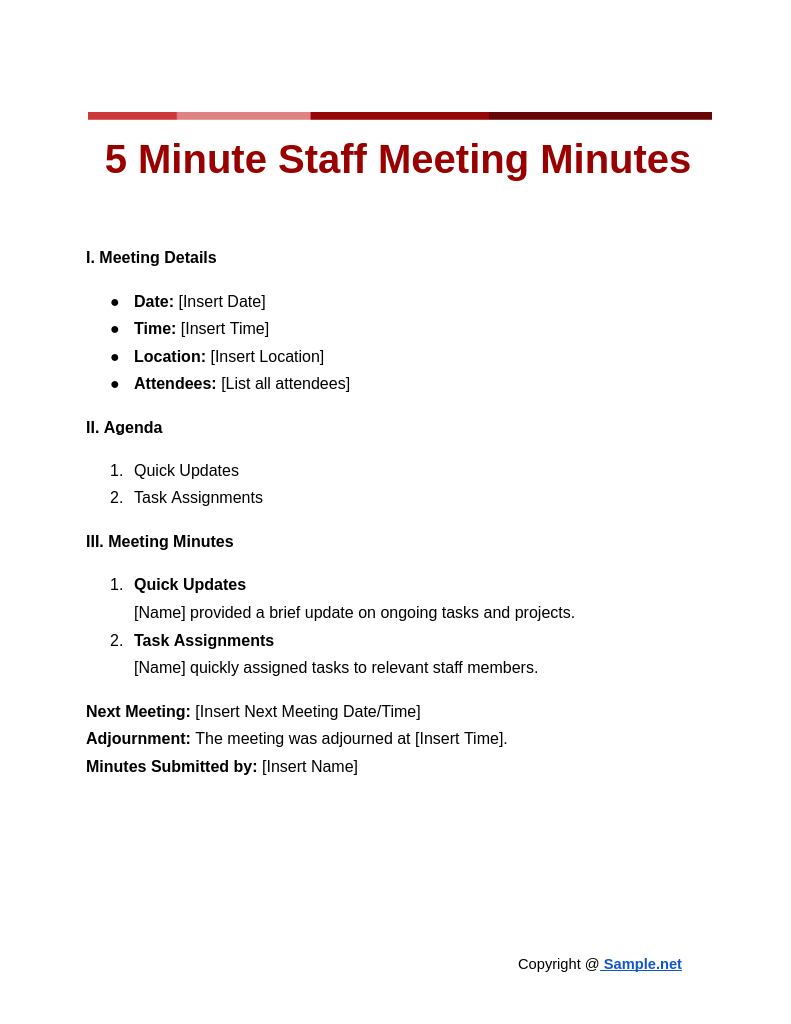
5 Minute Staff Meeting Minutes
download now -
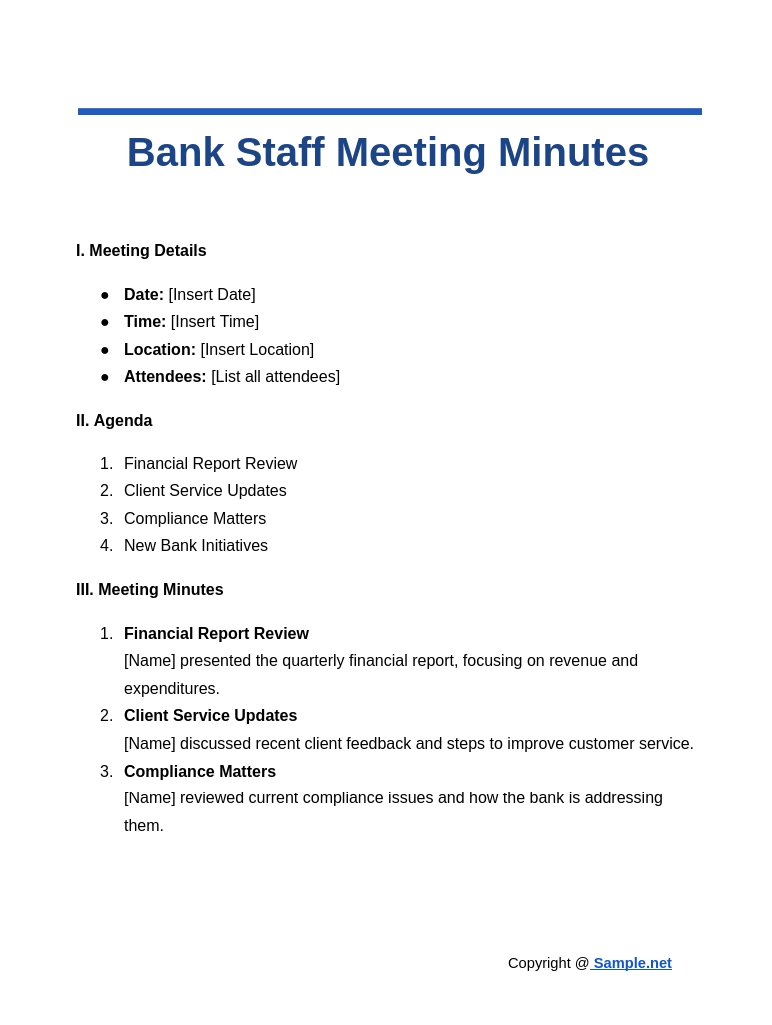
Bank Staff Meeting Minutes
download now -
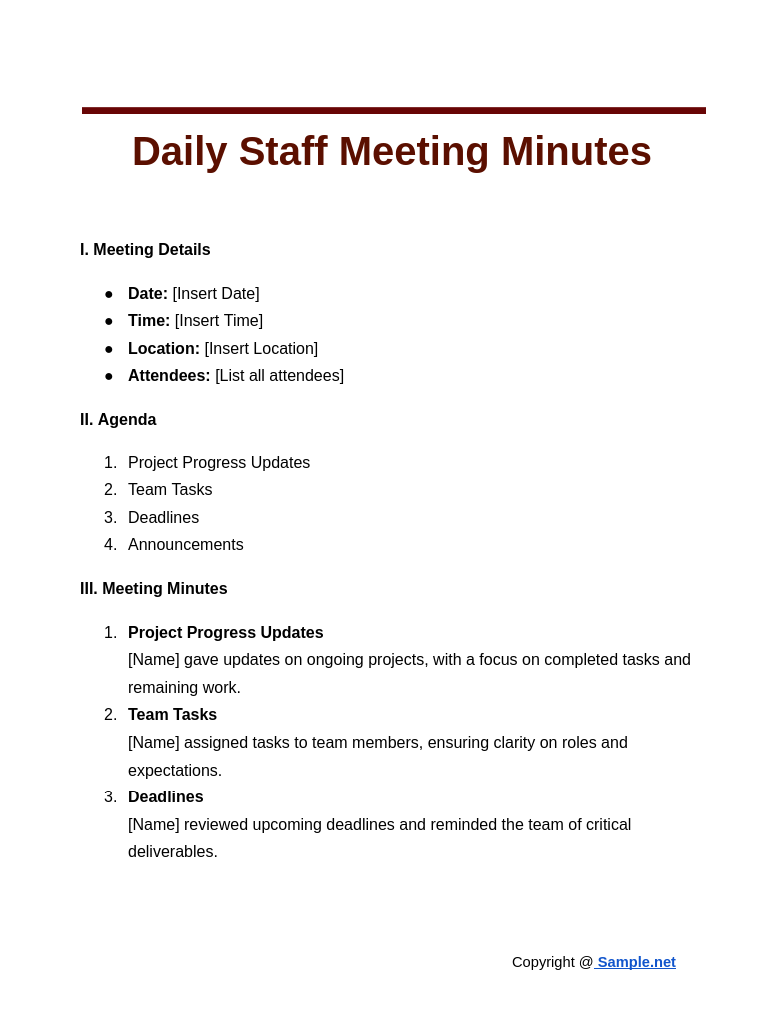
Daily Staff Meeting Minutes
download now -
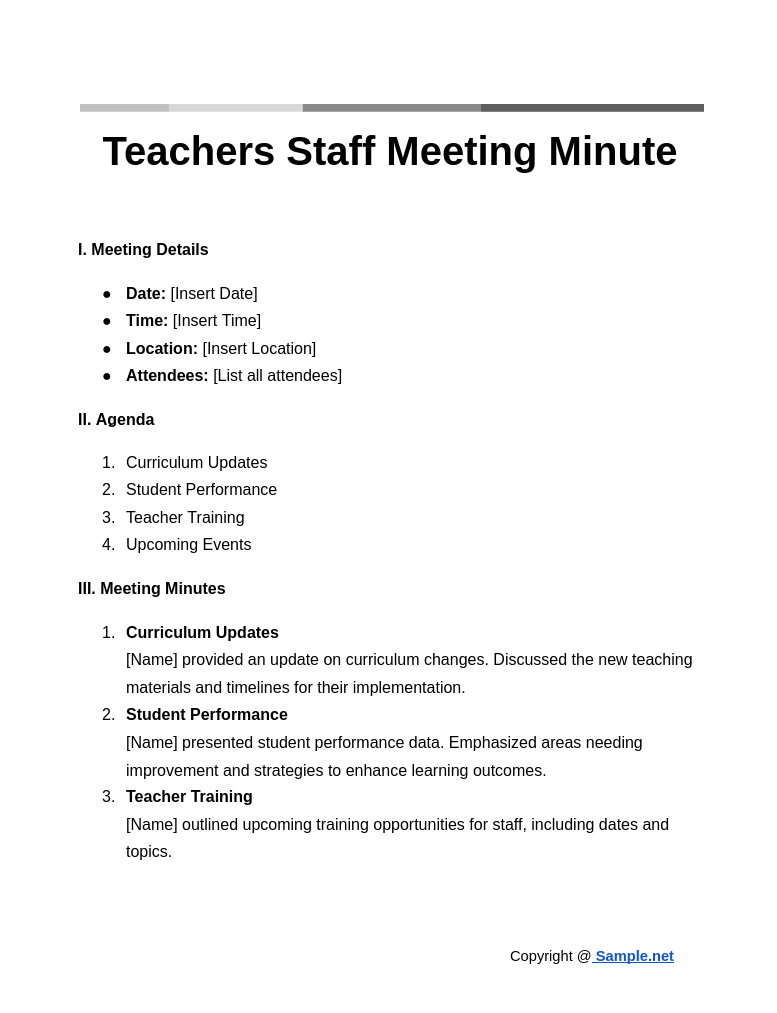
Teachers Staff Meeting Minute
download now -
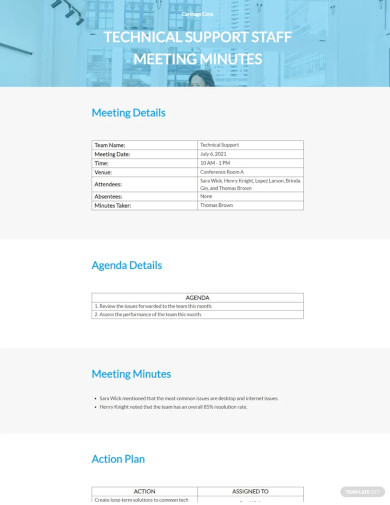
Simple Staff Meeting Minutes Template
download now -
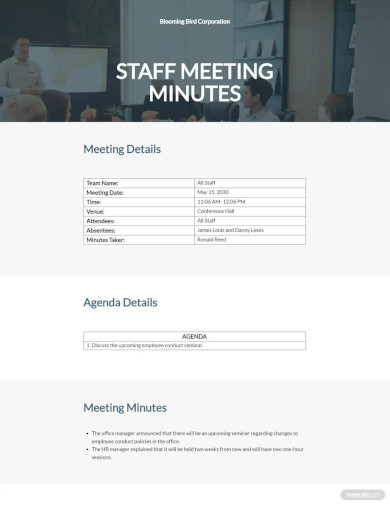
Sample Staff Meeting Minutes Template
download now -
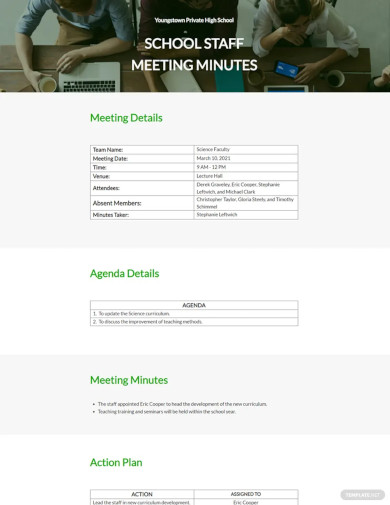
School Staff Meeting Minutes Template
download now -
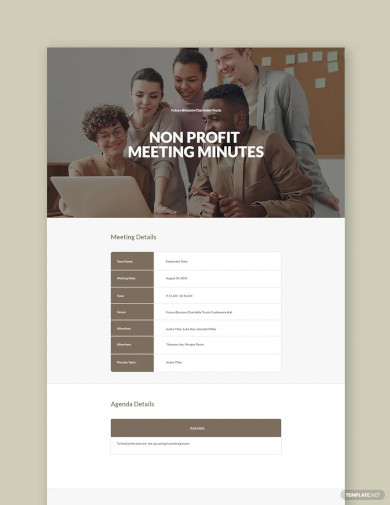
Free Nonprofit Staff Meeting Minutes Template
download now -
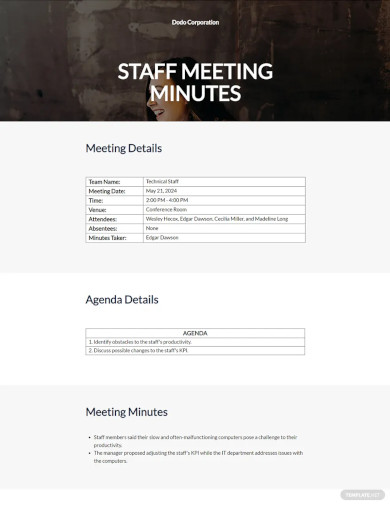
Staff Meeting Minutes Template
download now -
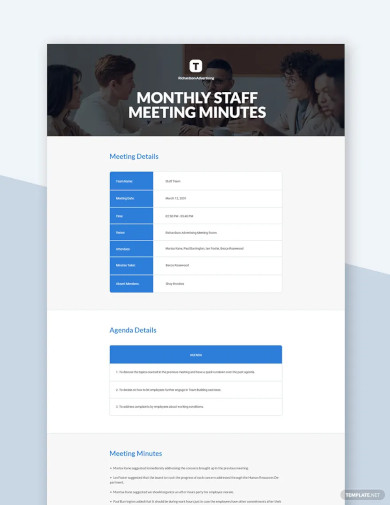
Monthly Staff Meeting Minutes Template
download now -
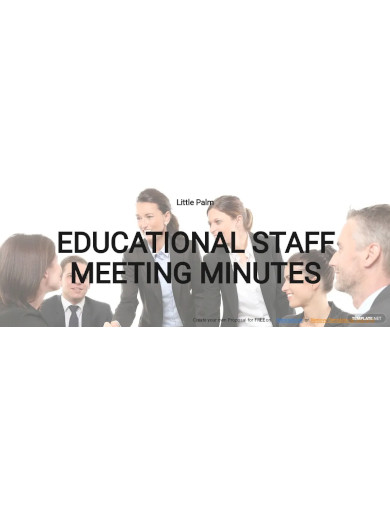
Educational Staff Meeting Minutes Template
download now -
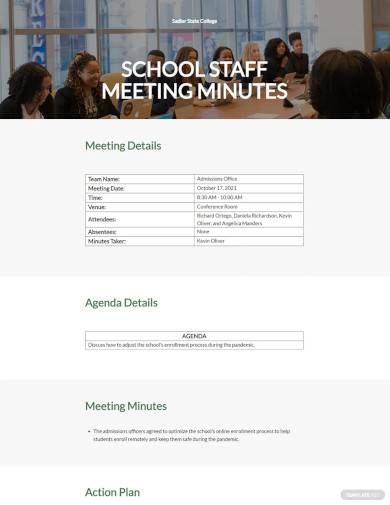
Sample School Staff Meeting Minutes Template
download now -
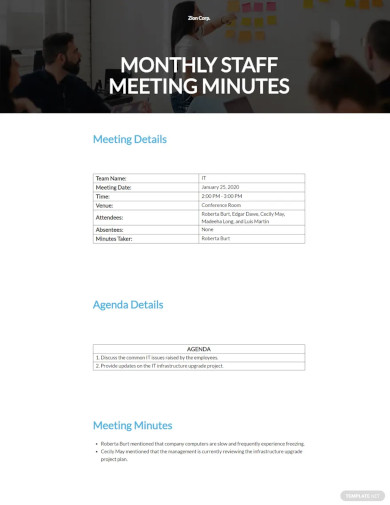
Monthly Staff Meeting Minutes
download now -
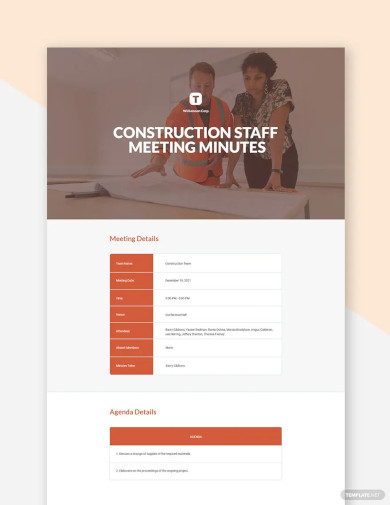
Construction Staff Meeting Minutes Template
download now -
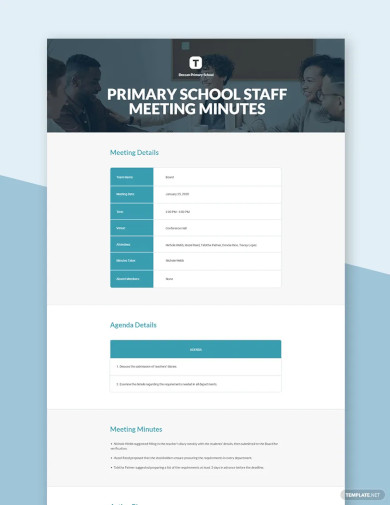
Primary School Staff Meeting Minutes Template
download now -
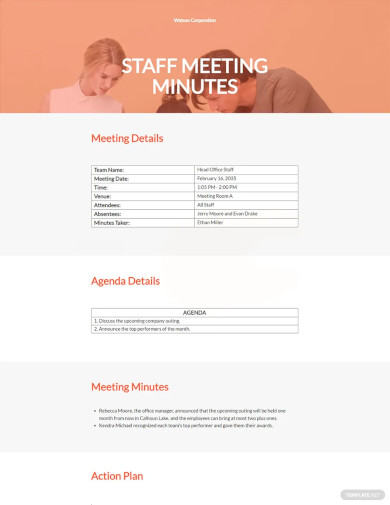
Informal Staff Meeting Minutes Template
download now -
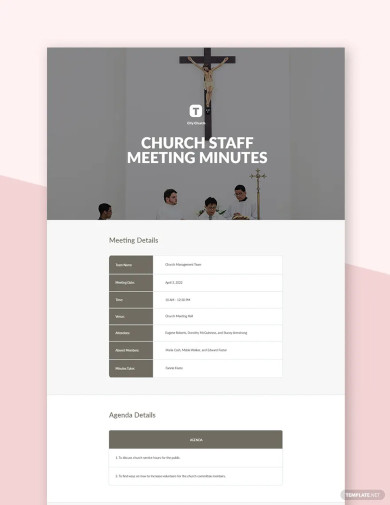
Church Staff Meeting Minutes Template
download now -
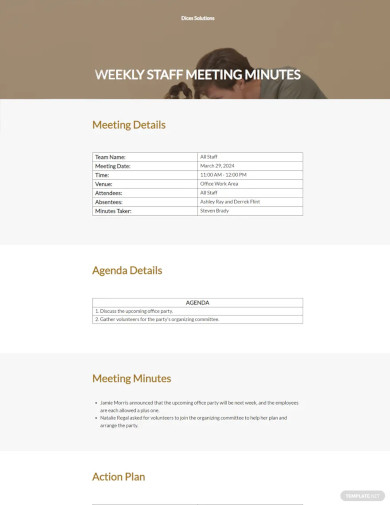
Weekly Staff Meeting Minutes Template
download now -
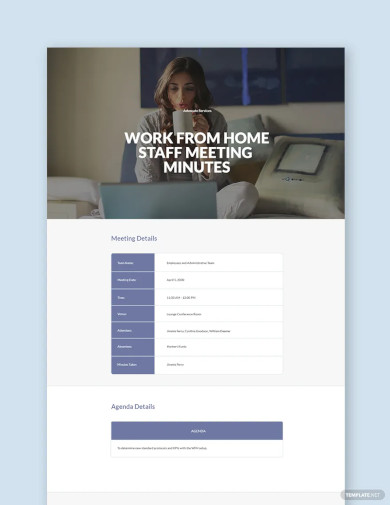
Work From Home Staff Meeting Minutes Template
download now -
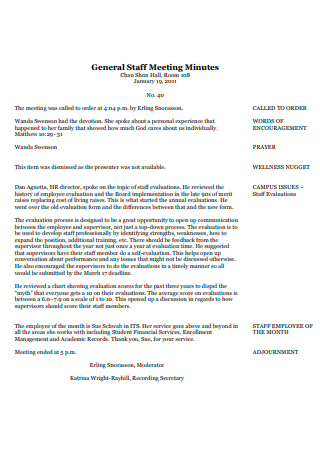
General Staff Meeting Minutes
download now -
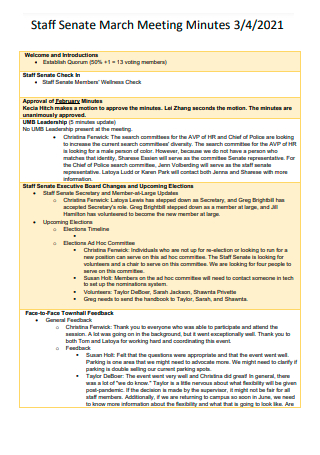
Basic School Staff Meeting Minutes
download now -
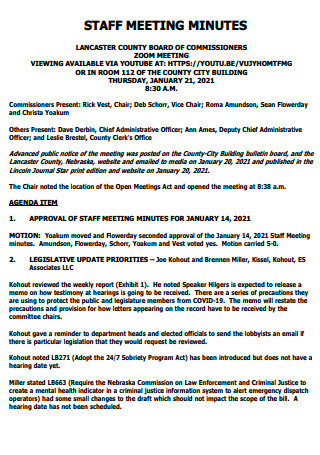
Staff Team Meeting Minutes in PDF
download now -
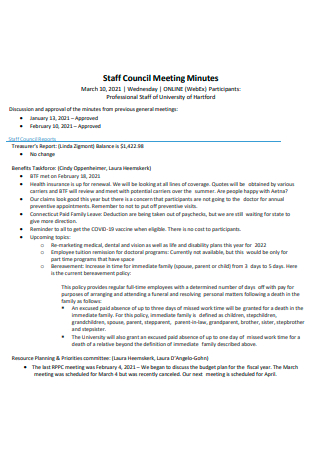
Staff Council Meeting Minutes
download now -
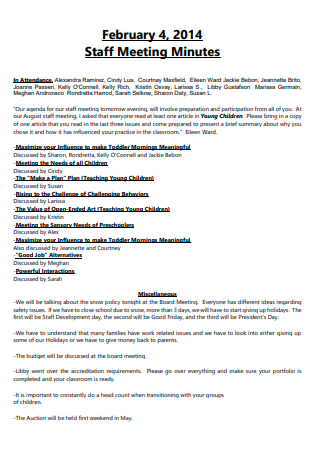
Child Care Staff Meeting Minutes
download now -
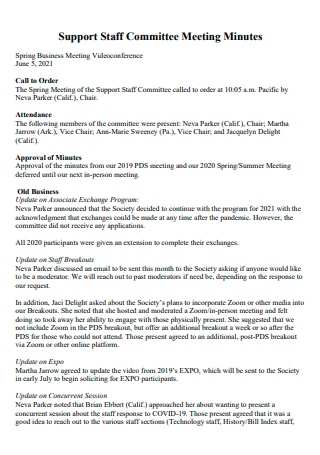
Employee Staff Committee Meeting Minutes
download now -
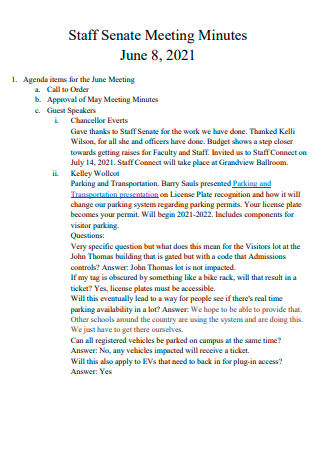
Writing Staff Meeting Minutes Example
download now -
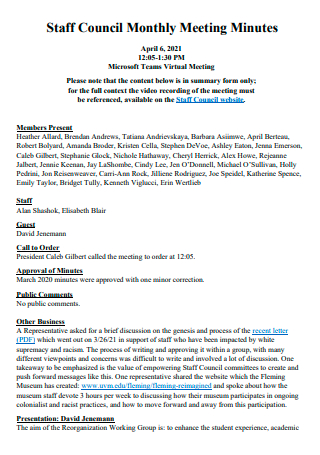
Staff Monthly Meeting Minutes
download now -
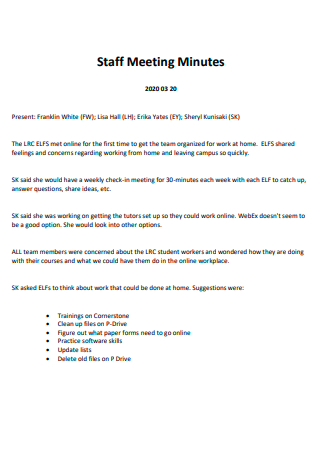
Standard Restaurant Staff Meeting Minutes
download now -
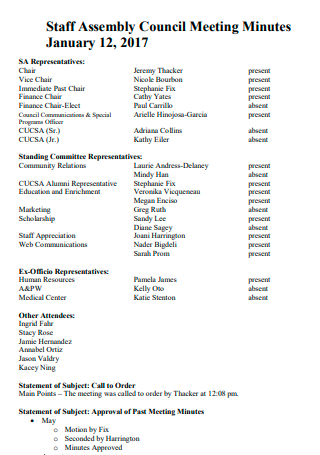
Staff Assembly Administrative Meeting Minutes
download now -
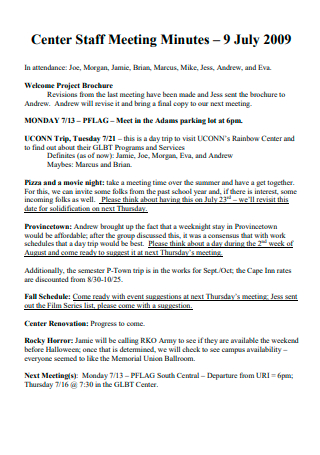
Company Meeting Staff Meeting Minutes
download now -
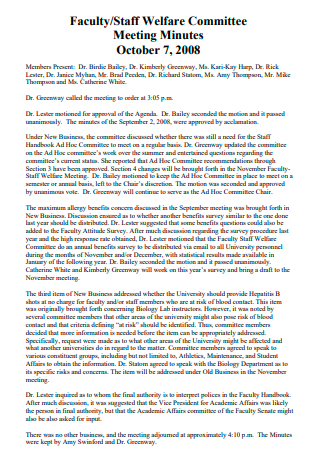
Editable Staff Meeting Minutes
download now -
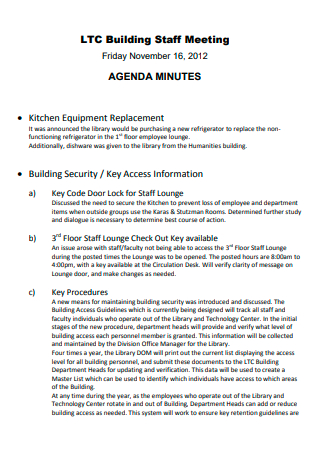
Building Staff Meeting Agenda Minutes
download now -
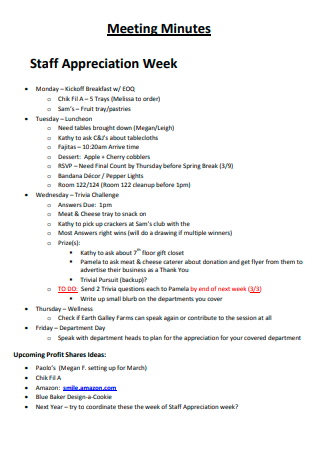
Nursing Staff Meeting Minutes
download now -
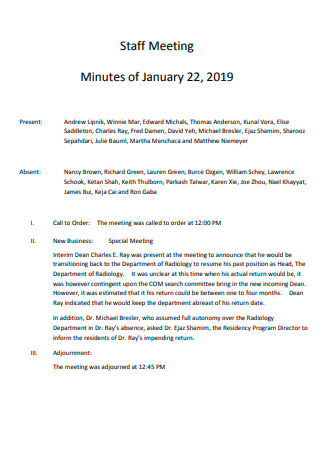
Staff Meeting Minutes Outline
download now -
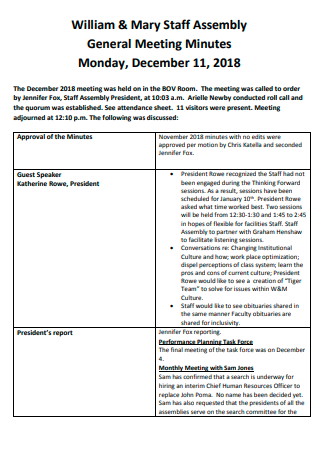
Blank Staff Meeting Minutes
download now -
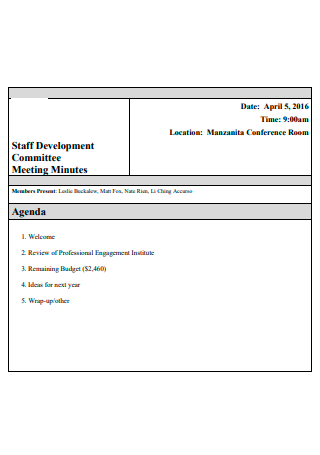
Staff Departmental Meeting Minutes
download now -

Staff Meeting Minutes Summary
download now -
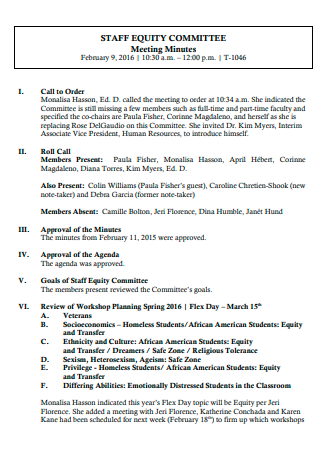
Staff Meeting Minutes Presentation
download now -
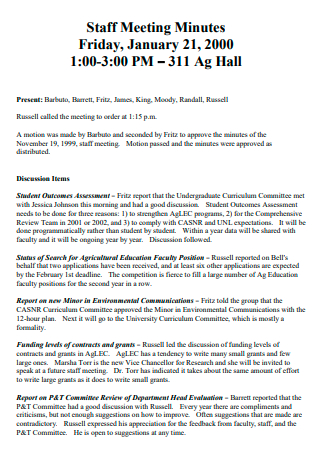
Staff Faculty Meeting Minutes
download now -
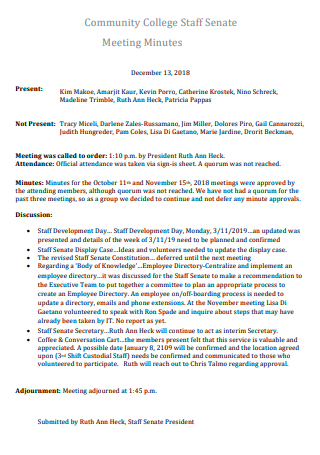
Community College Staff Meeting Minutes
download now -
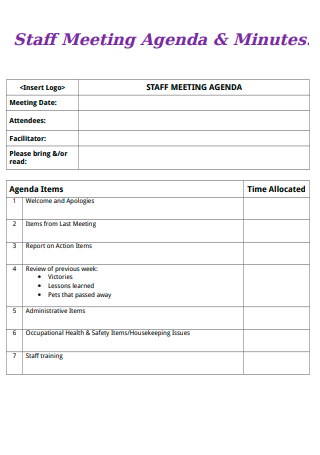
Staff Meeting Agenda and Minutes Record
download now -
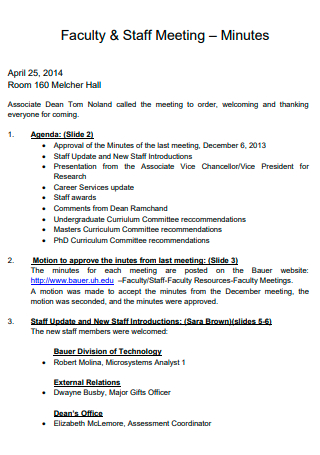
Faculty and Staff Meeting Minutes
download now -
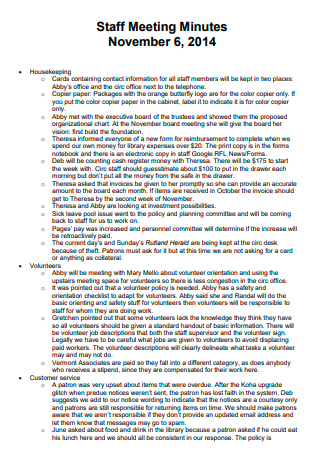
Training Staff Meeting Minutes
download now -
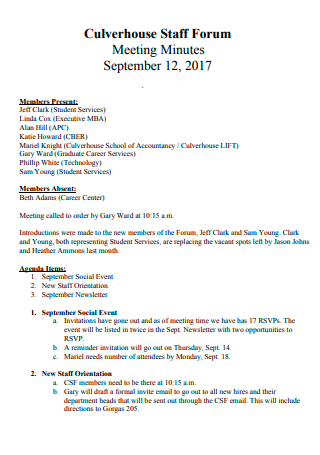
Closing Staff Meeting Minutes
download now -
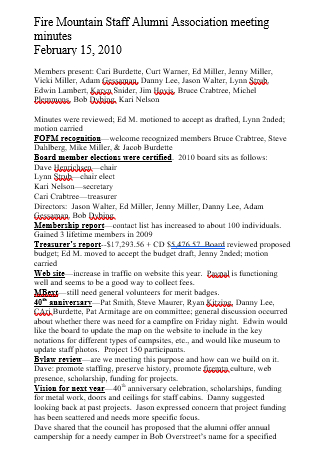
Staff Association Meeting Minutes
download now -
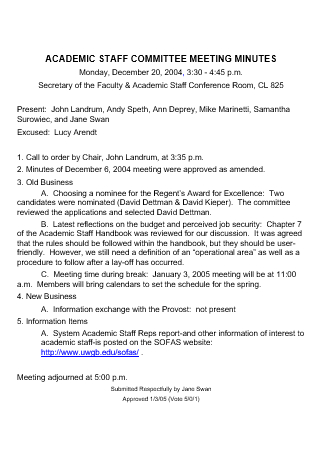
Academic Staff Committee Meeting Minutes
download now -
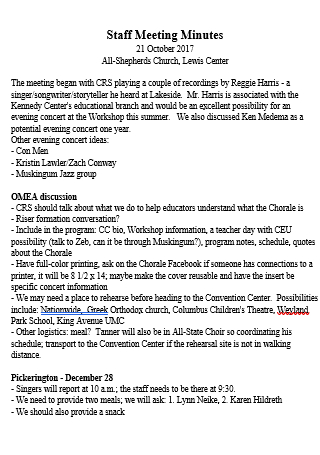
Staff Meeting Minutes in DOC
download now
FREE Staff Meeting Minutes s to Download
Staff Meeting Minutes Format
Staff Meeting Minutes Samples
What Is Staff Meeting Minutes?
What Is the Purpose of Staff Meeting Minutes?
What Should be Included in Meeting Minutes?
Who Benefits the Most from the Staff Meeting Minutes Template?
How do you Take Staff Meeting Minutes Effectively?
How to Write Staff Meeting Minutes?
FAQs
How Do You Begin a Staff Meeting?
What Do You Discuss in Departmental Staff Meetings?
What is the Format of Meeting Minutes?
Who is Responsible for Taking Minutes in a Staff Meeting?
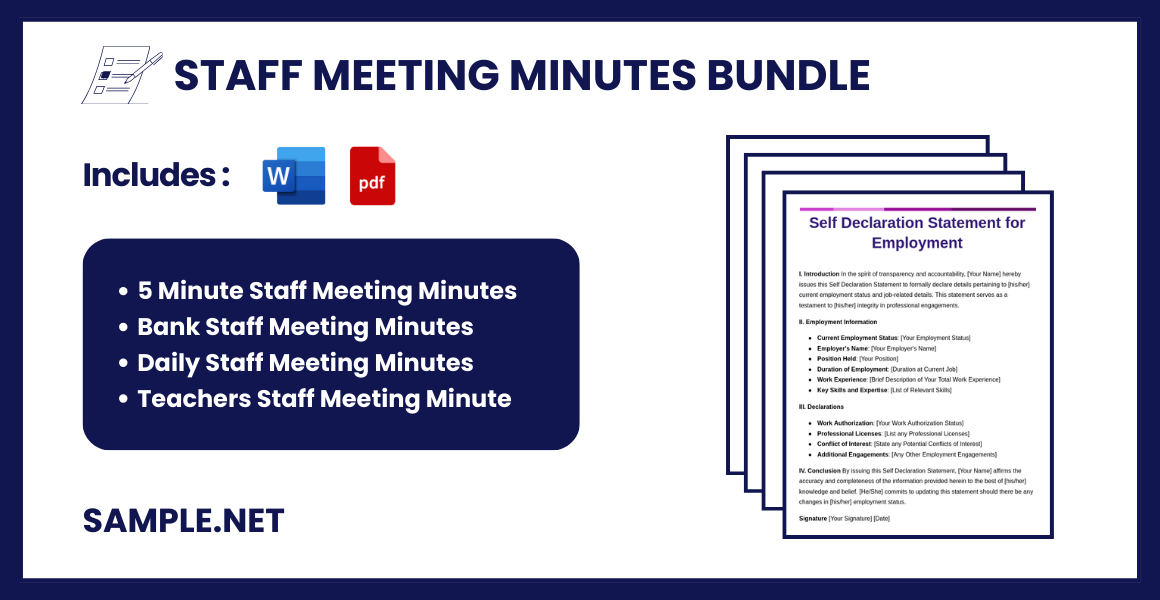
Download Staff Meeting Minutes Bundle
Staff Meeting Minutes Format
Date: [Insert Date]
Time: [Insert Time]
Location: [Insert Location]
Facilitator: [Insert Facilitator’s Name]
Attendees:
- [List of Attendees]
1. Agenda Overview
- [Brief summary of the meeting agenda items]
2. Review of Previous Meeting Minutes
- [Summarize the key points or decisions from the last meeting]
- [List any follow-up actions]
3. Key Discussion Points
- Topic 1: [Insert Topic]
- Discussion: [Summarize the discussion]
- Decision/Outcome: [Summarize decisions made]
- Action Items:
- [Person responsible] – [Task] – [Due date]
- Topic 2: [Insert Topic]
- Discussion: [Summarize the discussion]
- Decision/Outcome: [Summarize decisions made]
- Action Items:
- [Person responsible] – [Task] – [Due date]
- Topic 3: [Insert Topic]
- Discussion: [Summarize the discussion]
- Decision/Outcome: [Summarize decisions made]
- Action Items:
- [Person responsible] – [Task] – [Due date]
4. General Updates/Announcements
- [Summary of any general updates or announcements]
5. Action Items Review
- [Review of the tasks assigned, who they’re assigned to, and their deadlines]
6. Next Meeting
- Date: [Insert Next Meeting Date]
- Time: [Insert Next Meeting Time]
- Location: [Insert Next Meeting Location]
Meeting Adjourned at: [Time]
Minutes prepared by: [Your Name]
Approval of Minutes: [Facilitator’s Signature or Approval]
What Is Staff Meeting Minutes?
A staff meeting minutes is a legally binding document that serves as a record of what takes place at a company meeting. This form should have a plethora of information. For example, the names of the people who will be attending the meeting and the smart goals of the meeting. You should also include the date and any choices made by both the employees and the chairman of the board. The minutes of a meeting are an important piece of documentation for any company. You can also see more on Weekly Meeting Minutes.
What Is the Purpose of Staff Meeting Minutes?
The purpose of staff meeting minutes is to:
- Record important decisions: Minutes serve as a reference for decisions made during the meeting, which helps to prevent confusion or miscommunication.
- Track progress: By documenting actions and assignments, minutes help ensure that tasks are followed up and completed.
- Maintain accountability: They provide a clear record of who was present and what responsibilities were delegated.
- Ensure transparency: Minutes make meetings more accessible to those who were unable to attend and offer a level of transparency to stakeholders.
- Assist in future meetings: They can be used to build agendas for future meetings and help keep track of ongoing projects. You can also see more on Training Meeting Minutes.
What Should be Included in Meeting Minutes?
Before beginning to record any details, a designated minutes recorder should become acquainted with the types of information that they will be required to record. Although a particular method for taking notes may be preferred by a group, the minutes of meeting normally include the following information:
- The date and time of the meeting were recorded
- Participants’ names, as well as the names of those who were unable to attend
- Acceptance of the minutes of the previous meeting, or modifications to the minutes of the previous meeting
- Each item on the sample agenda has decisions made regarding it, such as activities undertaken or agreed upon, Election results, as well as Motions that are either accepted or denied.
- Starting a new business proposal is an exciting prospect. The date and hour of the next meeting will be announced soon.
Who Benefits the Most from the Staff Meeting Minutes Template?
Staff meeting minutes templates, without a doubt, assist in the efficient operation of staff meetings. Startups, on the other hand, are the types of firms that enjoy the most benefits. The majority of startups are completely clueless when it comes to minimizing the amount of time and effort that goes into organizing a staff meeting. And it is for this reason that they make extensive use of templates. Templates assist them in efficiently keeping track of every minute of every meeting. This allows them to hold and manage staff meetings with less effort as a result. You can also see more on Monthly Meeting Minutes.
In the event that you are the founder of a startup and are interested in holding regular staff meetings, here is what you will need to ensure that they are carried out without difficulty: staff meeting minutes templates. Amazing templates can be downloaded from reputable online sites. It is possible to find numerous websites that provide available free templates for their consumers. If cost-effectiveness is all that you are concerned with, you can go with them. In order to have more advanced designs, you will almost certainly have to spend out some money. Regardless, all templates are designed to make the process of documenting meeting minutes as pleasant as possible. You can also see more on Administrative Meeting Minutes.
How do you Take Staff Meeting Minutes Effectively?
Here’s a short guide on how to take staff meeting minutes effectively:
- Prepare in advance: Review the agenda and set up a template.
- Focus on key points: Capture discussions, decisions, and action items, not every detail.
- Stay organized: Follow the agenda structure and keep notes concise.
- Record responsibilities: Note who is assigned tasks and their deadlines.
- Stay neutral: Keep the minutes objective and free of opinions.
- Review for accuracy: Proofread and confirm key details after the meeting.
- Distribute promptly: Share minutes with attendees and relevant stakeholders soon after the meeting.
How to Write Staff Meeting Minutes?
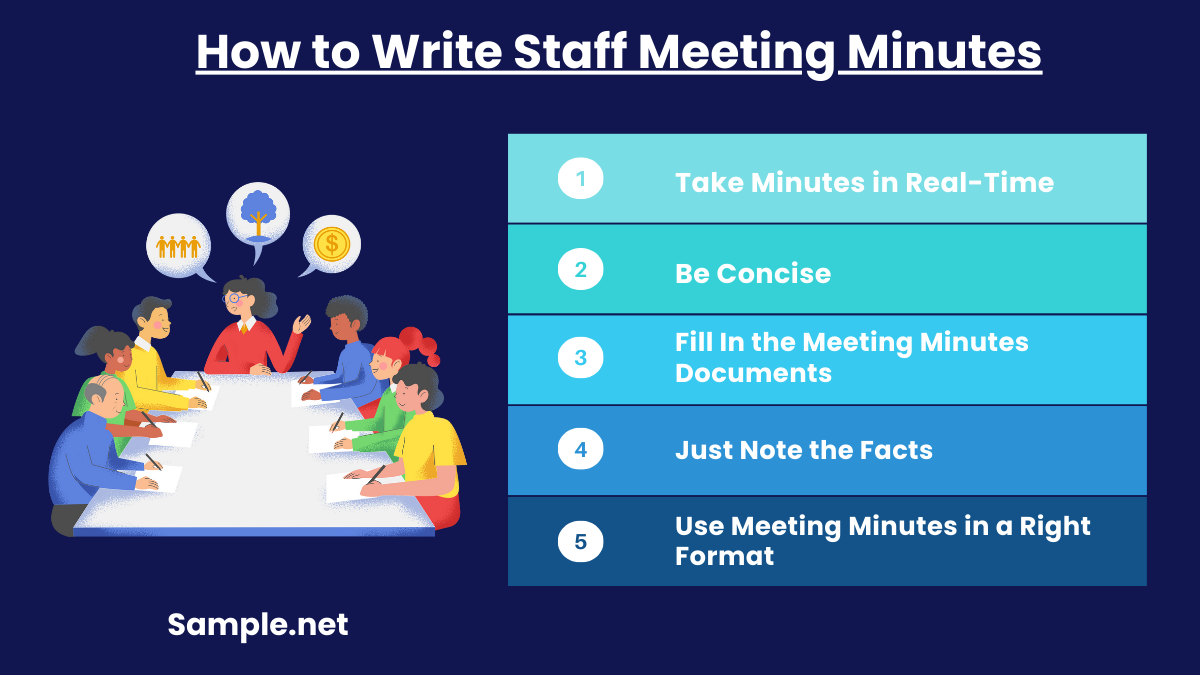
Everyone on the team is working 12-hour days, you were required to submit your own patient accountability reports yesterday, and you made analysis plans with your best friends for a night out on Friday. How do you hold the necessary staff meeting to guarantee that everyone receives what they require – and in record time? The same methods apply whether you’re working with a time restriction and a stressed-out crew or organizing your nurses’ staff meeting during a period of regular downtime. You can also see more on Management Meeting Minutes.
1. Take Minutes in Real-Time
Begin by sketching down an outline of the meeting agenda. Fill in the blanks with additional information about agenda items while the material is still fresh in your mind—in real-time.
2. Be Concise
Your creative writing abilities will have to take a backseat (for now). Write the minutes as if you were a reporter for a newspaper. Take notes on what is going on during the meeting. However, only the broad strokes have been recorded in writing. You do not require a verbatim transcript of all that has been said.
3. Fill In the Meeting Minutes Documents
When it comes to writing minutes, there is a delicate balancing act to be performed. Although it is important to keep minutes succinct, you must also offer sufficient background for future reference. Remember that it’s common practice to go over meeting notes at the start of the next meeting, so be prepared. For example, the approval of the minutes from the previous meeting is often the first item on the agenda of a board meeting. As a meeting note-taker, you must make a judgment call about how much context to offer.
4. Just Note the Facts
When preparing meeting minutes, stay away from making personal observations. If you wish to make separate notes for yourself, it is very acceptable to me. However, the minutes of the meeting should be a true record of what was discussed.
5. Use Meeting Minutes in a Right Format
If you’re drafting formal meeting minutes, there’s a specific format you should follow. In the case of labor unions, schools, municipal and county governments, and other organizations. However, with informal meeting minutes, you have a greater degree of flexibility. Consider what your company requires, as well as what has been done in the past. Then iterate on that process to make it better.
Staff meeting minutes are crucial for documenting the outcomes of meetings, maintaining accountability, and ensuring that all participants are on the same page. By following a structured process for taking, reviewing, and distributing minutes, you ensure that your organization keeps a reliable record of important discussions and decisions. You can also see more on Community Meeting Minutes.
FAQs
How Do You Begin a Staff Meeting?
A welcome speech is given at the beginning of a meeting, much as it is during events and seminars. Begin by extending greetings and expressing gratitude to everyone in attendance. As a courtesy, you should also describe yourself and your position within the organization. It is not necessary for you to provide a detailed introduction of yourself. Keep it short and to the point. Following your welcoming speech, the following step is to quickly go over each of the meeting’s objectives in more detail.
What Do You Discuss in Departmental Staff Meetings?
The majority of departmental meetings are held for the goal of addressing problems and making decisions. One of these reasons is to recognize the member’s accomplishments by presenting them with an employee award certificate, among other things. Meetings are also a good opportunity to introduce newly hired personnel and announce promotions to existing employees. Essentially, executives have meetings to discuss key topics that have the potential to affect the firm either positively or badly.
What is the Format of Meeting Minutes?
The title of the meeting, the event schedule, and the location of the meeting are all included in the first section of the meeting minutes. The names of those who will be attending should be listed after that. Following the attendance list, you should describe the purpose of the team meeting as well as the agenda for the meeting. In the final section, you should specify the time and date of the following meeting.
Who is Responsible for Taking Minutes in a Staff Meeting?
Typically, a designated secretary, administrative assistant, or another team member is responsible for recording the minutes. The chairperson may assign this role.
